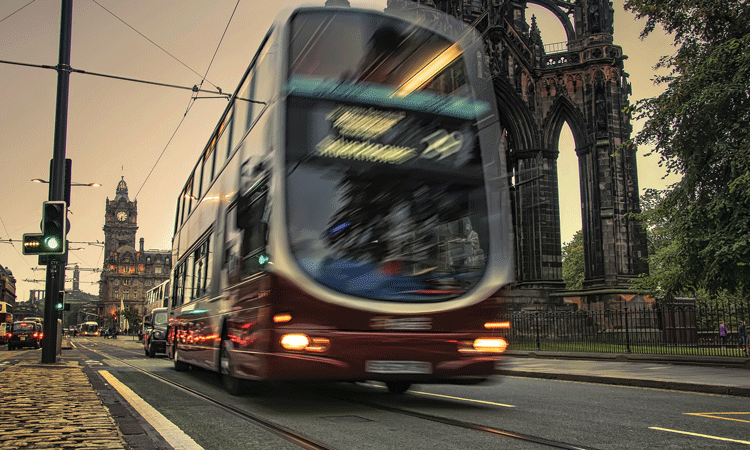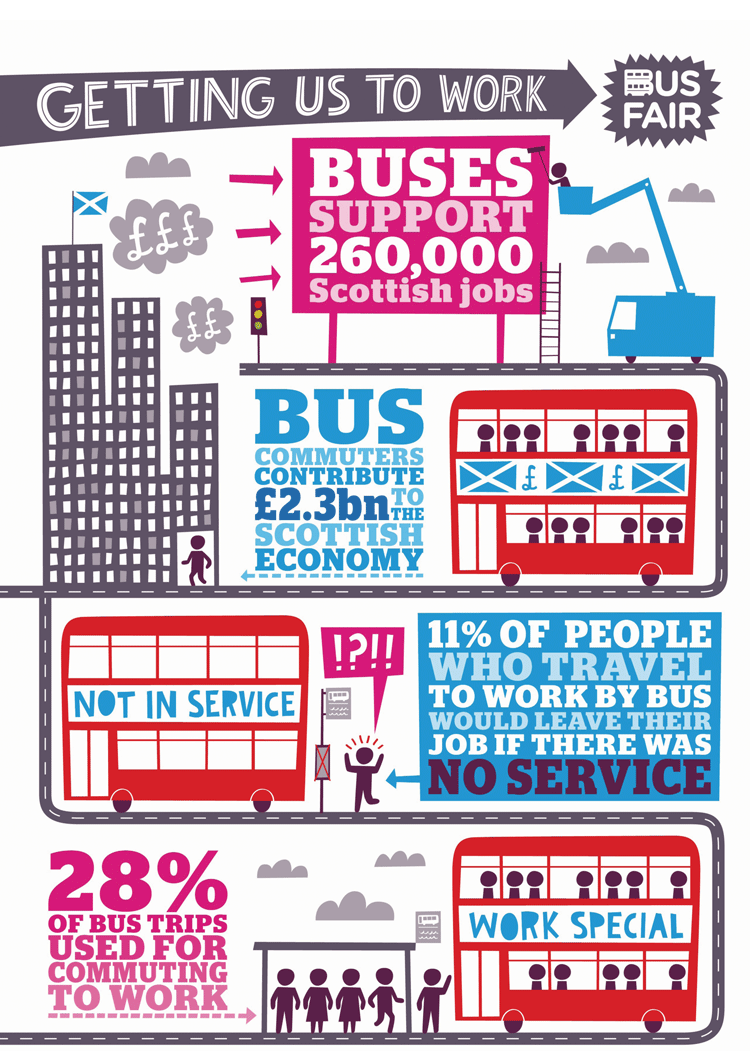A fair deal for Scotland’s bus users
- Like
- Digg
- Del
- Tumblr
- VKontakte
- Buffer
- Love This
- Odnoklassniki
- Meneame
- Blogger
- Amazon
- Yahoo Mail
- Gmail
- AOL
- Newsvine
- HackerNews
- Evernote
- MySpace
- Mail.ru
- Viadeo
- Line
- Comments
- Yummly
- SMS
- Viber
- Telegram
- Subscribe
- Skype
- Facebook Messenger
- Kakao
- LiveJournal
- Yammer
- Edgar
- Fintel
- Mix
- Instapaper
- Copy Link
Posted: 26 October 2015 | Colin Howden (Transform Scotland) | No comments yet
Buses get us to and from where we work; they give us access to shopping and leisure activities; they provide a vital service to those with low incomes and mobility issues; and they connect people and communities with each other. Buses carry lots of people at one time, thus reducing the number of vehicles on the road, which in turn helps to reduce traffic congestion and pollution. Colin Howden, Director of Transform Scotland, explains the Bus Fair campaign and how over the coming months, results from research will be presented to demonstrate the huge benefits that buses bring to Scotland: for the economy, in tackling inequalities, and cutting road congestion.


A cursory study of the UK mainstream media’s coverage of transport might lead one to believe that railways are the mainstay of public transport. In Scotland our ferries also receive much attention; and in Edinburgh the debate that our very fine tram line has provoked has been rather disproportionate to the number of people it serves. But it is of course buses that provide the overwhelming majority of public transport trips in Scotland and in most other places.
However, not everything is rosy with Scotland’s buses. Despite still providing three-quarters of all public transport trips, the decline of the bus continues – albeit less precipitous over the past 15 years than in previous decades – with a fall in bus patronage (10% over the past five years), vehicle mileage (12%) and bus fleets (14%).
Bus services are not given the political support or high profile attention they deserve. It was for this reason that we launched our ‘Bus Fair’ campaign, to turn greater attention to improving the standing of bus services in transport discussions, and draw attention to the measures needed to reverse these negative trends. Most of all we wanted to highlight the fairness aspects of transport investment.
The current big issue in Scottish transport is the Scottish government’s proposals for halving and then abolishing Air Passenger Duty. Setting aside the damaging impacts of such a policy for Anglo-Scottish rail services and the prospects for Scotland to meet its climate targets, the equity implications of such a move are startling. It is remarkable that the Scottish National Party (SNP) – a party that likes to style itself as ‘left-of-centre’ – sees as its set-piece intervention in transport a tax cut for air travellers, one which will bring disproportionate financial benefits for frequent flyers on higher incomes.


Bus commuters make a massive contribution to the Scottish economy.
Contrast this situation with that of the bus sector. Since the SNP took power in 2007, its investment into bus services and concessionary fares has been static, at around £250 million per annum (and declining in real terms). Should the government press ahead with its plans to provide an annual tax cut to aviation of £300 million by abolishing APD, one does begin to worry from whose budget this cash will be taken. With rail and ferry franchise payments locked in, and with an ever-expanding roads programme, will the Scottish government turn to the bus budget to fund its aviation subsidies?
Such a move would have deeply damaging social repercussions. Buses are much more important for the young and for older travellers; groups who often have no car alternative. It would also have gender implications, with women being 1.5 times more likely to use buses than men. Perhaps most strikingly, however, is the impact it would have on lower income groups who are five times more likely to use the bus than higher income groups.
For Scotland to have a ‘fair’ transport policy, it is imperative that more attention is given to improving conditions for bus travellers.
In this respect the government faces two key challenges: Firstly, giving buses priority in urban areas. Greener Journeys’ June 2016 report ‘The Impact of Congestion on Bus Passengers’ found that Edinburgh’s bus journeys during the morning peak were now 20% slower than 20 years ago. It is our wish to see local authorities incentivised by central government to invest in bus lanes and other priority measures, and to strengthen partnership working with the bus industry. The second problem that the government faces is what to do in rural areas. While losses to bus services in rural areas may not yet have been as severe as those highlighted by the ‘Save our Buses’ campaign in England, recent cutbacks in areas such as Dumfries and Galloway suggest that this contagion may be spreading north of the border.
What surprises us is that successive governments have not made the bus more central to our national transport policy. The bus industry should be seen as a major Scottish success story; the country being home to international transport companies, award-winning bus operators, and a major bus manufacturing industry. In FirstGroup and Stagecoach, headquartered in Aberdeen and Perth respectively, we have two of the UK’s largest companies. Meanwhile, in Alexander Dennis, we have the UK’s largest bus and coach manufacturer and a market leader in low carbon and zero emission technologies. It’s not as if government ministers have a large auto industry to placate: it is 35 years since Linwood, in the words of The Proclaimers, became ‘no more’. Meanwhile, the tax cuts that ministers propose handing to aviation will, in the end, prove to be of greatest benefit to our lowland airports – and the airlines that use them – none of whom have Scottish ownership.
Our ‘Bus Fair’ campaign will, over the coming months, publish new research into the benefits that buses bring for the economy in tackling inequalities and cutting road congestion. So far we’ve established the contribution that bus commuters make to the Scottish economy. We’ve found that buses support 260,000 Scottish jobs; that bus commuters contribute £2.3 billion to the Scottish economy; and that 11% of people who travel to work by bus at some point in time would leave their job if there was no bus service. We’ve also found the value that buses provide in getting people to retail and leisure destinations, contributing to £3.6 billion and £330 million of economic activity, respectively. We will soon be publishing our results on the benefits buses bring in terms of reducing emissions and cutting congestion.
Fortunately, the next year provides many opportunities for the Scottish government to set forth a more enlightened transport policy; one that would both provide greater fairness in transport and which would benefit the troubled Scottish economy. In 2017 we are expecting a comprehensive review of the National Transport Strategy. We are also expecting a new Climate Change Bill as well as a new Climate Change Plan. All of these processes provide ample opportunities for new thinking to transform the country’s appreciation of the role of the bus.


Related topics
Air Quality, Passenger Experience
Issue
Issue 5 2016
Related modes
Bus & Coach
Related cities
Europe







